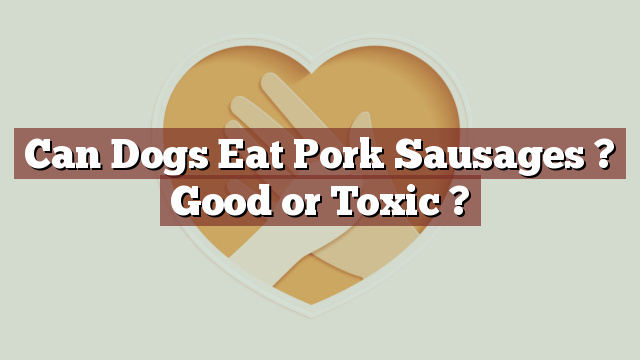Can Dogs Eat Pork Sausages? Good or Toxic?
When it comes to feeding our beloved canine companions, it is crucial to be aware of what foods are safe for them to consume. The nutritional needs of dogs are different from those of humans, and certain foods that we enjoy may not be suitable for our furry friends. Pork sausages, a popular food item in many households, often raise questions about whether they can be safely given to dogs. In this article, we will explore the nutritional value of pork sausages, assess their safety and potential toxicity for dogs, discuss the risks and benefits of feeding dogs pork sausages, and provide guidance on what to do if your dog consumes this food.
Nutritional Value of Pork Sausages: Macronutrients and Vitamins
Pork sausages are a source of protein, fat, and various vitamins and minerals. However, it is important to note that they are also high in sodium and fat content. The protein in pork sausages can be beneficial for dogs, as it helps support muscle development and repair. Additionally, certain B vitamins found in pork sausages, such as thiamine and niacin, can contribute to a dog’s overall health. However, it is crucial to consider the potential risks associated with feeding pork sausages to dogs.
Can Dogs Eat Pork Sausages? Assessing Safety and Toxicity
Can dogs eat pork sausages? The answer is no, dogs should not consume pork sausages. While small amounts of cooked, plain pork may be safe for dogs, the seasonings, spices, and additives in pork sausages can be harmful to their health. Garlic and onion, commonly used in sausage preparation, contain compounds that can be toxic to dogs and may lead to conditions such as anemia. Moreover, the high sodium and fat content in sausages can contribute to obesity, pancreatitis, and other health issues in dogs. It is best to avoid feeding pork sausages to your four-legged companion to ensure their well-being.
Potential Risks and Benefits of Feeding Dogs Pork Sausages
Feeding dogs pork sausages can pose several risks to their health. The seasonings and additives used in sausage production can cause gastrointestinal upset, leading to vomiting, diarrhea, or even more severe complications. Additionally, the high fat content in sausages can lead to pancreatitis, a painful inflammation of the pancreas. Furthermore, the sodium levels in pork sausages can contribute to dehydration and increase the risk of heart problems in dogs. Given these potential risks, it is strongly advised to avoid feeding pork sausages to dogs.
What to Do If Your Dog Eats Pork Sausages: Steps to Take
If your dog has accidentally consumed pork sausages, it is important to take immediate action. Consulting a veterinarian is crucial, especially if your dog exhibits any abnormal symptoms or reactions. The vet may recommend inducing vomiting to prevent further complications or provide guidance on managing any potential adverse effects. It is essential to provide your veterinarian with accurate information about the quantity and ingredients of the sausages ingested, as this will help them determine the appropriate course of action for your dog’s well-being.
Conclusion: Balancing Risks and Benefits of Feeding Pork Sausages to Dogs
In conclusion, it is best to avoid feeding pork sausages to dogs due to their potential toxicity and harmful effects on canine health. While pork sausages may contain beneficial nutrients, the risks associated with their consumption outweigh any potential benefits. It is essential to prioritize the well-being of our furry companions and provide them with a balanced diet that meets their specific nutritional needs. If you have any concerns or questions regarding your dog’s diet, it is always recommended to consult a veterinarian for professional advice tailored to your pet’s individual requirements.
Thank you for investing your time in exploring [page_title] on Can-Eat.org. Our goal is to provide readers like you with thorough and reliable information about various dietary topics. Each article, including [page_title], stems from diligent research and a passion for understanding the nuances of our food choices. We believe that knowledge is a vital step towards making informed and healthy decisions. However, while "[page_title]" sheds light on its specific topic, it's crucial to remember that everyone's body reacts differently to foods and dietary changes. What might be beneficial for one person could have different effects on another. Before you consider integrating suggestions or insights from "[page_title]" into your diet, it's always wise to consult with a nutritionist or healthcare professional. Their specialized knowledge ensures that you're making choices best suited to your individual health needs. As you navigate [page_title], be mindful of potential allergies, intolerances, or unique dietary requirements you may have. No singular article can capture the vast diversity of human health, and individualized guidance is invaluable. The content provided in [page_title] serves as a general guide. It is not, by any means, a substitute for personalized medical or nutritional advice. Your health should always be the top priority, and professional guidance is the best path forward. In your journey towards a balanced and nutritious lifestyle, we hope that [page_title] serves as a helpful stepping stone. Remember, informed decisions lead to healthier outcomes. Thank you for trusting Can-Eat.org. Continue exploring, learning, and prioritizing your health. Cheers to a well-informed and healthier future!

